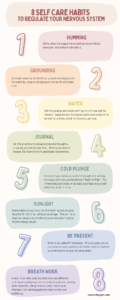8 Simple Self Care Habits To Regulate Your Nervous System
Regulating your nervous system might seem like something that should happen naturally, but when it’s disrupted by stress overload or a traumatic event, it can throw your entire system off balance. In these cases, resetting and regulating your nervous system becomes essential. Fortunately, there are several effective techniques and routines that can help, many of which are supported by scientific studies. However, always consult your doctor before starting any new regulation techniques.
In my own journey to reduce stress and reclaim my overall health and well-being, I’ve found these practices to be incredibly beneficial. They’ve helped me maintain calm and focus, even in the face of life’s challenges.
FREE DOWNLOAD BELOW!
See the bottom of this post for a simple guide you can download and print to practice daily. It’s important to incorporate these techniques regularly, not just when you’re feeling stressed. Make this into a new daily routine for best results. Regular practice helps develop neuropathways in the brain, making it easier to access these calming techniques when you need them most.
How to Use This Guide and practice the steps on an 8 Day Schedule:

Start by practicing one of these techniques per day for eight days. Once you’ve tried each one, gradually increase to practicing two per day until you’re regularly incorporating all eight techniques into your daily routine. Remember, your nervous system might respond better to some techniques than others, but offering a variety of practices ensures that both your mind and body can find balance.
The 8 Steps to Regulate Your Nervous System
- Humming Humming is more than just a soothing sound. It stimulates the vagus nerve, which plays a crucial role in calming the nervous system. When you hum, the vibrations send a signal to your brain to release relaxation hormones, reducing stress and anxiety. Try humming your favorite tune or even a single note for a few minutes. The key is to focus on the vibration and let it resonate through your body.
- Grounding Grounding, also known as earthing, involves connecting your body directly with the earth. This practice can help discharge built-up energy and tension, bringing your nervous system back to a calm state. To practice grounding, simply walk barefoot on grass, sand, or dirt for at least 10-15 minutes a day. You can also sit or lie down on the ground, focusing on the sensations of the earth beneath you.
- Drink Water Staying hydrated is essential for maintaining a healthy nervous system. Dehydration can increase cortisol levels, leading to stress and anxiety. Make it a habit to drink water throughout the day. If you’re feeling particularly stressed, try sipping on a glass of cool water. The act of drinking can also serve as a mindful moment, helping you to pause and reset.
- Journaling Journaling is a powerful tool for processing emotions and clearing mental clutter. Writing down your thoughts, feelings, and experiences allows you to release pent-up emotions, making space for calm and clarity. Set aside 10-15 minutes each day to journal. You can write about anything that’s on your mind or focus on specific prompts like gratitude, daily intentions, or reflections on your stress levels.
- Cold Plunge Cold exposure has been shown to activate the parasympathetic nervous system, which is responsible for rest and relaxation. A cold plunge or even a cold shower can help reduce inflammation, boost your mood, and calm your nervous system. Start with short exposures, like a 30-second cold shower, and gradually increase the time as you become more comfortable.
- Sunlight Sunlight is a natural mood booster and helps regulate your circadian rhythm, which is closely linked to your nervous system’s functioning. Aim to spend at least 10-20 minutes outside each morning, letting the natural light hit your skin and eyes. This practice not only helps regulate your sleep-wake cycle but also increases the production of serotonin, the “feel-good” hormone.
- Be Present Practicing mindfulness or simply being present in the moment can significantly reduce stress. This involves bringing your full attention to the here and now, without judgment. You can practice mindfulness through meditation, deep breathing, or even during daily activities like eating or walking. The goal is to focus on your senses and the experience of the present moment, helping to quiet the mind and soothe the nervous system.
- Breathwork Breathwork involves intentional breathing exercises that can help regulate the nervous system. Deep, slow breaths signal to your body that it’s safe to relax, while rapid, shallow breaths can increase stress. A simple technique to start with is the 4-7-8 breath: inhale through your nose for 4 counts, hold the breath for 7 counts, and exhale slowly through your mouth for 8 counts. Repeat this cycle a few times until you feel a sense of calm wash over you.
These eight practices can be life-changing when it comes to managing stress and maintaining overall well-being. Incorporate them into your daily routine, and over time, you’ll likely find yourself feeling more balanced, grounded, and resilient in the face of life’s challenges.
Get your Download here!
Click here to download a PDF version. 8 Self care habits to Regulate Your Nervous System









